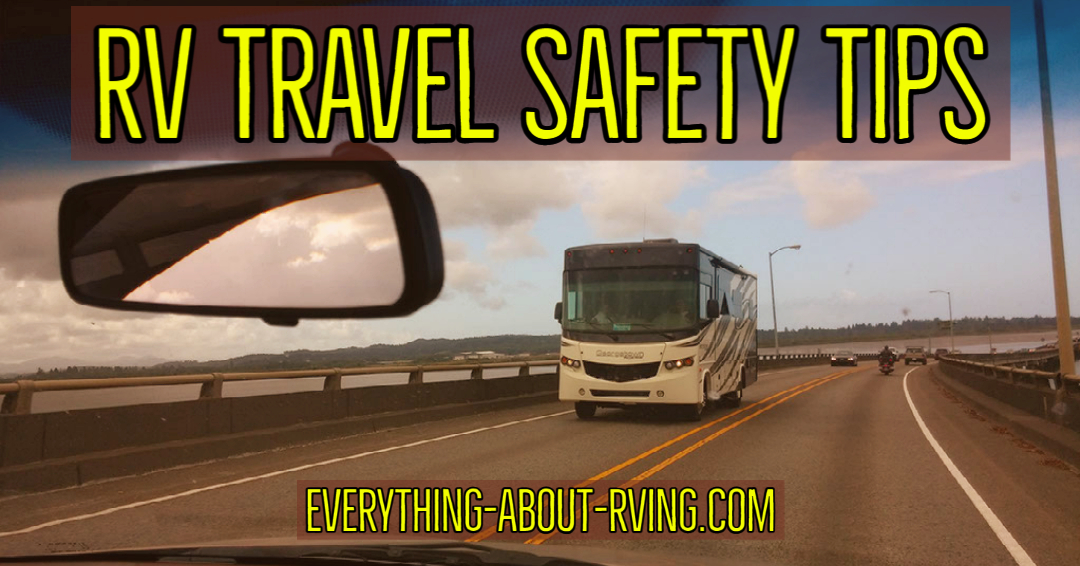- Home Page
- RVing Tips & Tricks
- Rv Travel Safety
RV Travel Safety Tips
Because of its size, driving an RV is very different from driving a car
By Kevin Gardner
A recreational vehicle is a self-contained form of traveling. You have to stop occasionally to replenish supplies, but otherwise, you carry everything you need with you, such as food storage and sleeping accommodations. This self-sufficient mode of travel can feel very freeing. However, that freedom comes at a price. In 2018, motor vehicle accidents resulted in over 36,000 deaths. While there do not seem to be statistics specifically for fatalities related to RV accidents, recreational vehicles are often large and unwieldy, which may increase the risk for collisions. The first step to avoid an RV accident is to know the risks involved and take safety precautions to minimize them.
Practice Maneuvering
It would help if you did a few essential things before setting off on an RV trip, such as looking up insurance quotes to ensure total protection for you and your vehicle. However, do not get so hung up on planning details that you do not take any time to practice driving your RV. Because of its size, driving a recreational vehicle is very different from driving a car or pickup. While some of your skills apply, you will also have to learn new skills, and the only way to do that is with practice. You can ask for help from a friend who drives an RV, take a driving course, or practice on your own. Just be sure that you put safety first and practice in an area where you can do no damage, such as a dirt field or an empty parking lot.
Monitor the Weather
Inclement weather can lead to hazardous driving conditions resulting in accidents. When you plan a road trip in any vehicle, you need to keep tabs on the weather conditions you are likely to run into. This is even more important in a recreational vehicle, however. An RV's size and weight may make it even more challenging to handle or to likely tip over in high winds, fog, or ice conditions.
Perform Vehicle Maintenance
Don't let the self-sufficient feeling that a recreational vehicle gives you to lull you into a false sense of security about vehicle maintenance. An RV is subject to the same road stresses that other vehicles are and are no more capable of self-maintenance. Therefore, you should have regular checkups performed on your RV and an extra thorough inspection before you set off on a big trip. Be sure to pay extra close attention to the tires and towing equipment, as these are frequent sources of RVs problems.
Plan for Wide Turns
A recreational vehicle takes much wider turns than a car or pickup because it is so much larger. This is something you have to remain aware of at all times. It takes practice beforehand and care at the moment to make the turn without drifting out of your lane, tracking over someone else's property, or hitting the curb with your rear tires.
Control Your Speed
Your RV weight increases the braking distance that you need to bring your vehicle to a complete stop. Therefore, when you drive among other vehicles out on the road, you need to provide an extra cushion of space in which to stop. The faster you go, the greater braking distance you will need. Another practical reason to decrease your speed when driving a recreational vehicle is to improve your gas mileage. RVs are not very fuel-efficient in the first place, but going slower means consuming less gasoline, meaning less time and money spent at the pump and more time on the road. Just be sure that you pay attention to the speed limits because driving too slow can have legal consequences, just as driving too fast can.
In addition to the practical advantages of maintaining a lower speed while driving your RV, it also affords you the additional benefit of being able to enjoy the beauty of the area around you from the vehicle's oversized windshield, just one of many advantages of traveling in an RV.
Do you have any suggestions or comments on this topic? You can add them to this page by using the comments section located below.




